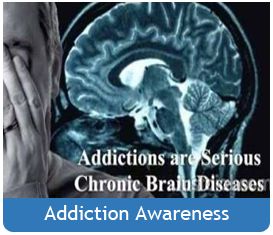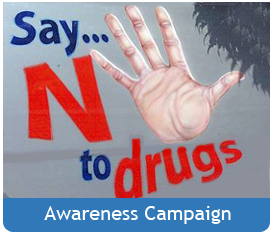 • Drug De-Addiction Awareness: • Drug De-Addiction Awareness:
--------------------------------------------------------------------------------------------------------------------------------
Addiction is a neurologically based disease. For many years recovery specialists have compared alcoholism or addictions to a physical disease: like diabetes. In reality addictions are more closely related to a neurological disorder like Tourette's Syndrome than they are to diabetes. If the problems you suffer stem from severe alcoholism or addiction, you must accept that these problems are not primarily mental or free will issues. Addictions are not about will power. The problems facing addicts, alcoholics, and their families are miserable, disgusting, and infuriating. They are often hopelessly discouraging. But to imagine that an addict "could change if he wanted to" is a serious misunderstanding of the long term dynamic of addictive disorder. The fact is precisely that an addict cannot change in the long run even if he wants to! That is the definition of addiction: "the loss of control over the use of a substance." It is important to understand that this loss of control is manifested not in terms of days or weeks, but in longer term behaviors: terms of months and years. The reason addicts have lost control is because they have suffered permanent physical neurological changes based in their brains and nervous systems. The disorder manifests in long term obsessive-compulsive behaviors outside the realm of the addicts own control. It is true enough that the use of chemicals begins with chosen behavior. But if alcoholism or addiction develops, the problem has moved outside the realm of free choice. It has developed into a long term mental and physical neurological disorder. All the emotional 'feelings' involved in drug or alcohol seeking are based in neurology. Addiction is based in physical dependency created by altered neurotransmitter balances, and driven by millions upon millions of new living, functioning active neurological pathways which have been established to sustain the condition in the addicts brain. The new neurological pathways are permanently established, and they will not just disappear. The primary neurological disorder is only complicated by physical dependence on the substances. The physical dependence on the substances is secondary! Physical drug withdrawal does not change the underlying neurological addictive disorder. After drug withdrawal, long term overpowering cravings are predictable. These cravings are, in reality, spontaneous nerve impulses. Even in the longer term, overwhelming cravings are outside the addicts control.
|
 • Awareness Campaign: • Awareness Campaign:
--------------------------------------------------------------------------------------------------------------------------------
Saying NO to drugs is so much more important that you realize. In fact, it is one of the most important decisions of your life, and one of the best decisions you will ever make. You should never even start taking drugs, or even just "try" them. If you have friends who do drugs, it is very likely that they will offer them to you. The first thing you need to do is to say NO, as soon as they are offered. The next thing you should do is get out of the environment where the drugs are being taken. If you're worried about being cool, make up some reason why you need to go.
|